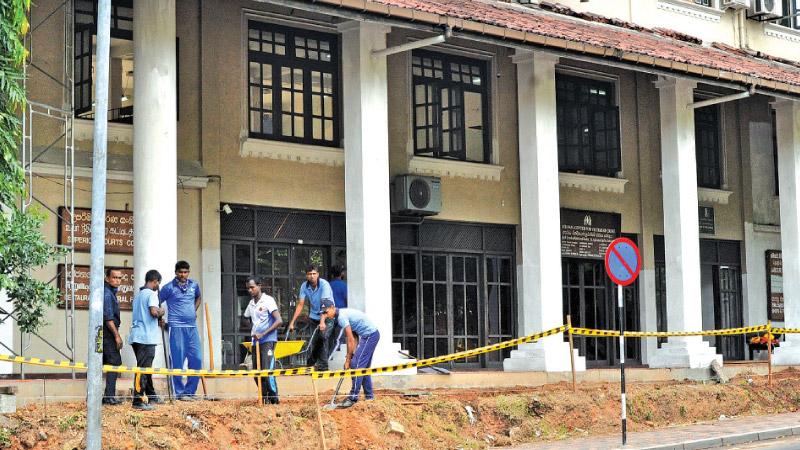
Nearly two months after Parliament enacted amendments to the Judicature Act to set up three special High Courts to hear corruption cases and cases of complex financial crime, the first court will be ready to commence hearings by July 4, with Sri Lanka Navy personnel working feverishly and round-the-clock to complete reconstruction work and refurbishment of the old building that was previously used as a traffic court in Hulftsdorp, in time for the opening session.
The building is located in front of the Sri Lanka Law College.
Known as the Permanent High Court at Bar, the special corruption court will be dedicated to hear cases relating to bribery, criminal breach of trust, misappropriation, money laundering, terrorist financing, organised crime and offences against public property.
The court will commence trials into corruption investigations that have been concluded, highly placed sources told the Sunday Observer. The Attorney General and the Commission to Investigate Allegations of Bribery and Corruption can refer cases to the special corruption court.
“It is one court with three judges presiding together. Thereafter, depending on workload additional courts will set up,” sources within the Justice Ministry told the Sunday Observer.
According to the Financial Crimes Investigation Department (FCID), over a hundred cases have been forwarded to the Attorney General’s Department, of which fifteen cases have been instituted in the High Courts. The remainder will be taken up at the Permanent High Court at Bar, after it is sanctioned by the Chief Justice, the sources said.
Under the new provisions, the Attorney General and the Director General of the Commission to Investigate Allegations of Bribery or Corruption (CIABOC) can forward the cases to the Chief Justice who will sanction the institution of proceedings before the permanent High Court at Bar, depending on its merit.
However, some Government backbenchers complained about the pace of setting up the courts and the need to provide the necessary infrastructure to enable the courts to operate smoothly.
“We expected all three courts to be gazetted and instituted at the initial
stage, however, only one court has been gazetted so far,” said one UNP State Minister who did not wish to be named.
Thirteen new judges were promoted as high court judges recently, of
which nine have been ear-marked for the Reports concerning 17 cases of serious fraud and corruption that had taken place during former President Mahinda Rajapaksa’s regime, compiled by the Presidential Commission to Inquire and Investigate into Serious Acts of Fraud and Corruption (PRECIFAC).
Dozens of other investigations completed by the Financial Crimes Investigation Division (FCID) are also awaiting prosecution. Public frustration has been mounting at the snail’s pace of investigations and delays to prosecute into excesses and abuses by the former Rajapaksa regime.
